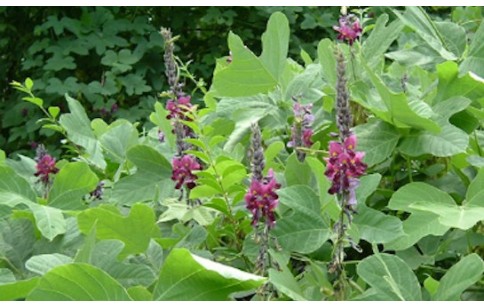- Code : #0557 S 10 mg
- Formula : C₁₅H₈O₅
- CAS : 479-13-0
Pueraria lobata
Pueraria lobata, belonging to the Fabaceae botanical family, is one of the Pueraria species called “Kudzu vine”. Native to South-East Asia, it is a vine that can grow 10 m long in thickets and thin woods. It is used as cover crop and fodder, and in cosmetics.
The root can be up to 1.8 m long and its starch has different culinary uses. It is staple food in Japan. Stems, young leaves and flowers are also edible.
In traditional Chinese medicine, flowers and tubers are used to treat alcoholism, fever, colds, diarrhea, dysentery, acute intestinal obstruction; angina pectoris and migraine. The root is used to treat fevers, gastrointestinal disorders, muscle aches, allergies, skin problems, high blood pressure, chronic alcoholism and measles.
The main components of the root are polyphenols, in particular isoflavonoids, and triterpenoids with their glycosides; namely daidzein (4′,7-dihydroxyisoflavone), daidzin, daidzein diacetate, daidzein dimethyl ether, genistein triacetate, and apigenin triacetate ; puerarin, etc.

- Code : #1370 S 20 mg
- Formula : C₁₅H₁₀O₄
- CAS : 486-66-8
- Code : #1371 S 20 mg
- Formula : C₂₁H₂₀O₉
- CAS : 552-66-9
- Code : #1248 S 10 mg
- Formula : C₁₆H₁₂O₄
- CAS : 485-72-3
- Code : #1372 S 20 mg
- Formula : C₁₅H₁₀O₅
- CAS : 446-72-0
- Code : #1233 S 10 mg
- Formula : C₂₁H₂₀O₉
- CAS : 3681-99-0
- Code : #1223 10 mg
- Formula : C₁₅H₁₀O₅
- CAS : 2150-11-0








